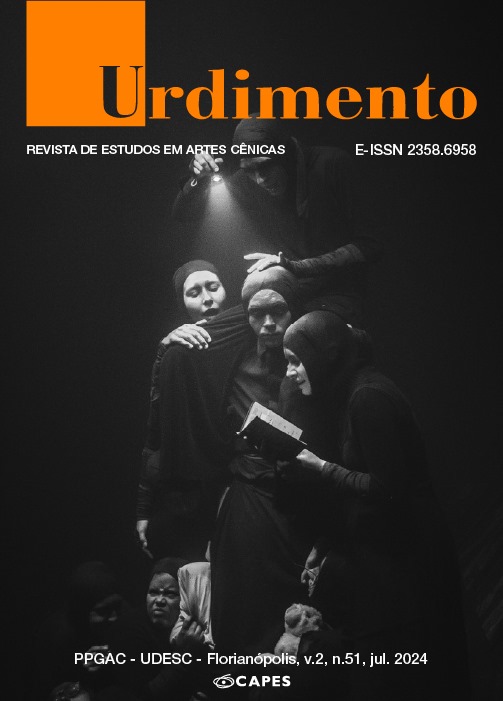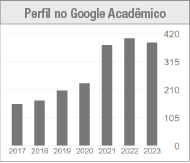Juntos somos mais fortes: o tratado “Sobre o coro”, de Sófocles
DOI:
https://doi.org/10.5965/1414573102512024e0114Palavras-chave:
coralidades, Sófocles, dramaturgiaResumo
Neste artigo propõe-se o estudo detido das implicações de um tratado sobre coros atribuído a Sófocles. Nessa obra perdida o foco era a atividade coral, compreendida por meio do confronto entre a tradição e sua renovação. A partir das referências indiretas à carreira e dramaturgia de Sófocles presentes em autores e obras da Antiguidade, buscou-se tornar compreensível os contextos performativos que melhor esclarecem as possíveis ideias e argumentos de Sófocles.
Downloads
Referências
BAGORDO, Andreas. Die antiken Traktate über das Drama: Mit einer Sammlung der Fragmente. Stuttgart & Leipzig: Teubner, 1998.
BAGORDO, Andreas. Lyric Genre Interactions in the Choruses of Attic Tragedy, in SKENÈ – Journal of Drama and Theatre Studies 1.1, p. 37–55 , 2015.
BAUER, Detlev. Der Chor im Theater des 20. Jahrhunderts: Typologie des theatralen Mittels Chor. Tübingen: De Gruyter, 2019.
BOWRA, Maurice. Sophocles on His Own Development. The American Journal of Philology, 61. 4 , p. 385-401, 1940.
CSAPO, Eric & SLATER, William. The context of ancient drama. Ann Arbor: The University of Michigan Press, 2001.
D’ANGOUR, Armand. “Old” and “New” Music: The Ideology of Mousikē. In: Tosca Lynch & Eleonora Rocconi (orgs.). A companion to ancient Greek and Roman music. Hoboken: Wiley, p. 409-420, 2020.
D’ANGOUR, Armand. The Greeks and the New: Novelty in Ancient Greek Imagination and Experience. Cambridge: Cambridge University Press, 2011.
De MARTINO, Francesco “Sofocle ‘stravagante,’” in Alan Sommerstein (org.). Shards from Kolonos: Studies in Sophoclean Fragments. Bari: Levante Editori, p. 435-464, 2003.
DUPONT, Florence. Aristóteles ou o vampiro do teatro ocidental. Desterro [Florianópolis]: Cultura e barbárie, 2017.
ELSE, Gerald. Aristotle's Poetics: The Argument. Cambridge: Harvard University Press, 1957.
ELSE, Gerald. The Origin and Early Form of Greek Tragedy. Cambridge: Harvard University Press,1965.
GARVIE, Alex. Aeschylus’ Supplices. Play and Trilogy. Cambridge: Cambridge University Press,1969.
GRIFFITH, Mark. Between Local and Global: Music and Cultural Identity in Ancient Greece. In: Tosca Lynch & Eleonora Rocconi (orgs.). A companion to ancient Greek and Roman music. Hoboken: Wiley, p. 381-396, 2020.
HERINGTON, John. Poetry into Drama. Early Tragedy and the Greek Poetic Tradition. Berkeley, Los Angeles e Londres: University of California Press, 1985.
JACKSON, Lucy. The Chorus of Drama in the Fourth Century BCE. Presence and Representation. Oxford: Oxford University Press,2020.
HANINK, Johana. Lycurgan Athens and the Making of Classical Tragedy. Cambridge classical studies. Cambridge/ New York: Cambridge University Press, 2014.
KAIMIO, Maarit. The Chorus of Greek Drama with the Light of the Person and Number Used. Helsinki: Societas Scientiarum Fennica, 1970.
KIERSTEAD, James. A community of communities: Associations and democracy in classical Athens. Tese, Department of Classics of the Stanford University, 2013. Disponível em https://purl.stanford.edu/vs820tt0644 . Acesso 10 04 2024.
KINKADE, Clinton. Sophocles’ Ancient Readers: The Role of Ancient Scholarship in the Reception of Greek Tragedy. Tese, Department of Classical Studies, Duke University, 2021.
KIRBY, John. Aristotle on Sophocles. In: Kirk Ormand (org.). A companion to Sophocles. Malden/ Oxford: Wiley-Blackwell, p. 411-423, 2012.
LAMARI, Anna. Reperforming Greek Tragedy: Theater, Politics, and Cultural Mobility in the Fifth and Fourth Centuries BC. Berlin/ Boston: De Gruyter, 2017.
LAMBERT, Stephen. The Phratries of Attica. Ann Arbor: University of Michigan Press, 1998.
LANATA, Giuliana. Poetica pre-platonica. Florença: La Nuova Italia, 1974.
MOTA, Marcus. A dramaturgia musical de Ésquilo. Brasília: Universidade de Brasília, 2008.
MOTA, Marcus. Teatro grego: Novas perspectivas In: Sandra Rocha (org.). Cinco Ensaios sobre a Antiguidade. São Paulo: Annablume, p.45-66,2011.
MOTA, Marcus. Ésquilo, o dramaturgo guerreiro. São Paulo: Giostri, 2020.
MOTA, Marcus. Vida de Ésquilo. Rónai – Revista de Estudos Clássicos e Tradutórios, v. 6.2, p. 52–62, 2018.
MOTA, Marcus. Questões sobre coralidades: formas e contextos de grupos performativos multissensoriais In: Bárbara Santos; Gustavo Henrique; Ricardo Malveira (orgs.). Teatro – Audiovisual – Literatura: diálogos e fronteiras. Palmas: EDUFT, p. 5-10, 2024.
MURRAY, Penelope & WILSON, Peter. Music and the Muses. The Culture of 'mousikē' in the Classical Athenian City. Oxford: Oxford University Press,2004.
NAEREBOUT, Fredrick. Attractive performances: ancient Greek dance; three preliminary studies. Amsterdã: J.C. Gieben, 1987.
NAGY, Gregory. Ancient Greek Elegy. In: Karen Weisman (org.). The Oxford Handbook of the Elegy. Oxford: Oxford University Press, p. 13-45, 2010.
PELLING, Christopher. Sophocles’ Learning Curve. In: Patrick Finglass; Christopher Collard; Nicholas Richardson (orgs.). Hesperos. Studies in Ancient Greek Poetry Presented to M. L. West on His Seventieth Birthday. Oxford: Oxford University Press, p. 204–227, 2007.
PINNOY, Mauritis. Plutarch's comment on Sophocles' style'. Quaderni Urbinati di Cultura Classica 45, p. 159-64,1984.
PLATÃO. A República. Introd., trad. e notas Maria Helena da Rocha Pereira. Lisboa: Fundação Calouste Gulbenkian, 2017.
POWER, Timothy. Sophocles and Music. In: Kirk Ormand(org.). A companion to Sophocles. Malden/ Oxford: Wiley-Blackwell, p. 283-304, 2012.
POWER, Timothy. New music in Sophocles’ Ichenutae. In: Rosa Andújar, Thomas R. P. Coward and Theodora A. Hadjimichael (orgs.). Paths of Song. The Lyric Dimension of Greek Tragedy. Berlin/Boston: De Gruyter, p. 343-362, 2018.
RADT, Stefan. Tragicorum Graecorum Fragmenta 4: Sophocles. Editio correctior et addendis aucta. Göttingen: Vandenhoeck und Ruprecht, 1999.
RODIGHIERO, Andrea. Generi lirico‐corali nella produzione drammatica di Sofocle.Tübingen: Narr Verlag. 2012.
ROSSETTI, Livio. Caratteristiche tipologiche dei trattati Περὶ φὐσεως nei ecoli VI-V a. C. Nova tellus, 24.2,p.111-146, 2006.
SCHÖNE, Angelika. Der thiasos, Eine ikonographische Untersuchung über das Gefolge des Dionysos in der attischen Vasenmalerei des 6. und 5. Jhs. v. Chr. Gotemburgo: P. Astroms, 1987.
SOMMERSTEIN, Alan. The Tetralogy. In: Jacques Bromberg & Peter Burian (orgs.). A companion to Aeschylus. Hoboken: Wiley Blackwell,2023.
SOUSA, Eudoro. A tragédia grega: origens: textos traduzidos e comentados. Marcus Mota e Luís Lóia (orgs.). Brasília: Universidade de Brasília, 2022.
SWIFT, Laura A. The Hidden Chorus. Echoes of Genre in Tragic Chorus. Oxford: Oxford University Press, 2010.
THOMAS, Rosalind. Oral Tradition and Written Record in Classical Athens. Cambridge: Cambridge University Press, 1989.
TYRREL, Blake. The Suda’s Live of Sophocles (Sigma 815). Translation and Commentary with Sources. Electronic Antiquity 9.1, 2006. Link: https://scholar.lib.vt.edu/ejournals/ElAnt/V9N1/TyrrellSuda.pdf
TYRRELL, William. Biography. In: Andres Markantonatos(org.). Brill’s Companion to Sophocles. Leiden/Boston: Brill, p.19-38, 2012.
VASSEUR-LEGANGNEUX, Patricia. Les Tragédies grecques sur la scène modern. Une utopie théâtrale. Villeneuve-d'Ascq: Presses Universitaires du Septentrion, 2004.
WEBSTER, Thomas. Athenian Culture and Society. Berkeley & Los Angeles: University of California Press, 1973.
WEST, Martin. Ancient Greek Music. Oxford: Clarendon Press, 1992.
WRIGHT, Mathew. The Reception of Sophocles in Antiquity. In: Andres Markantonatos (org.). Brill’s Companion to Sophocles. Leiden/Boston: Brill, p. 581-600, 2012.
Publicado
Como Citar
Edição
Seção
Licença
Copyright (c) 2024 Urdimento - Revista de Estudos em Artes Cênicas

Este trabalho está licenciado sob uma licença Creative Commons Attribution 4.0 International License.
Declaração de Direito Autoral
Os leitores são livres para transferir, imprimir e utilizar os artigos publicados na Revista, desde que haja sempre menção explícita ao(s) autor (es) e à Urdimentoe que não haja qualquer alteração no trabalho original. Qualquer outro uso dos textos precisa ser aprovado pelo(s) autor (es) e pela Revista. Ao submeter um artigo à Urdimento e tê-lo aprovado os autores concordam em ceder, sem remuneração, os seguintes direitos à Revista: os direitos de primeira publicação e a permissão para que a Revista redistribua esse artigo e seus meta dados aos serviços de indexação e referência que seus editores julguem apropriados.
Este periódico utiliza uma Licença de Atribuição Creative Commons– (CC BY 4.0)




